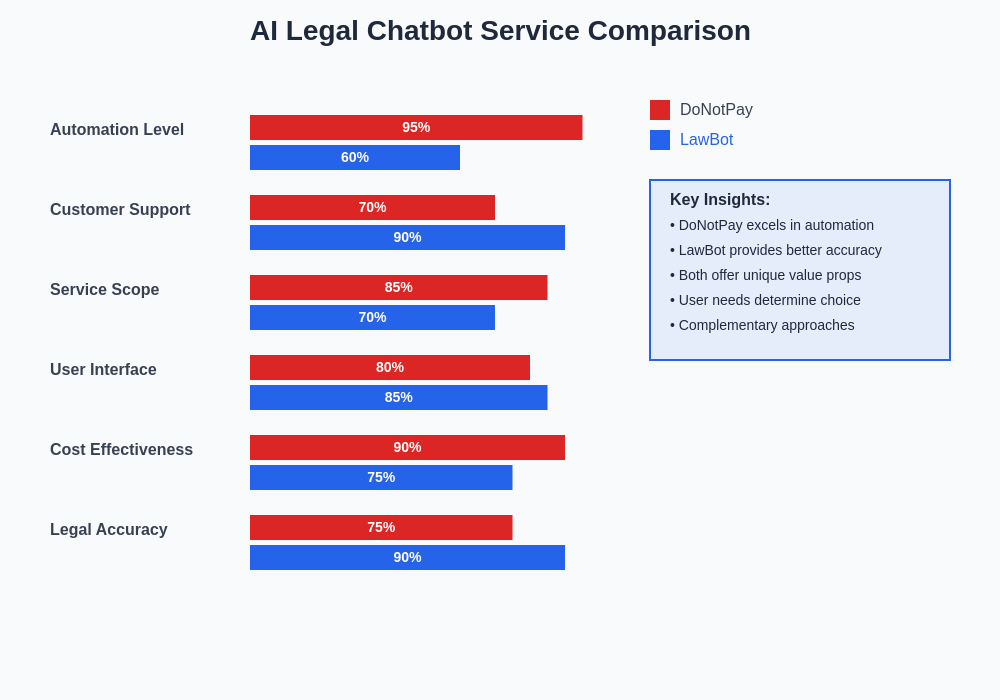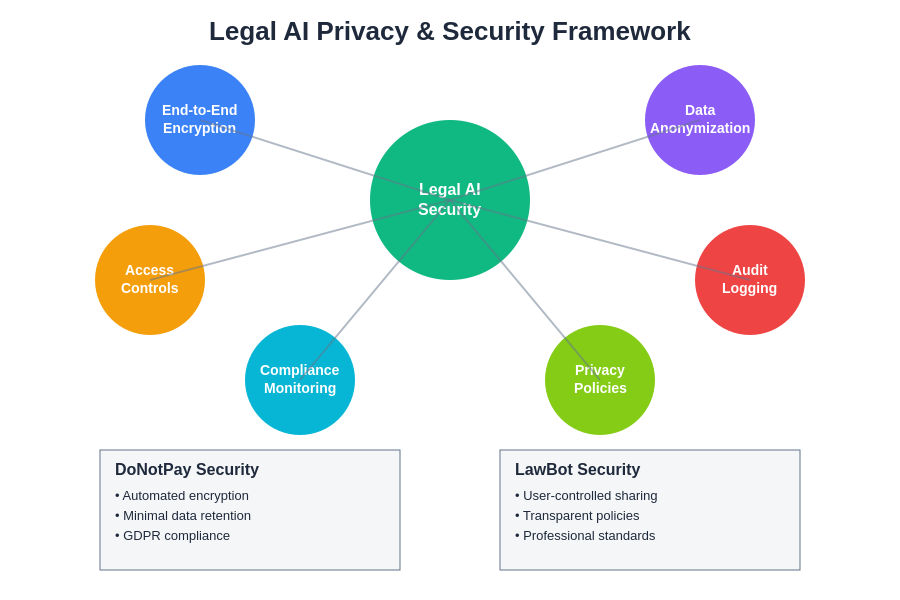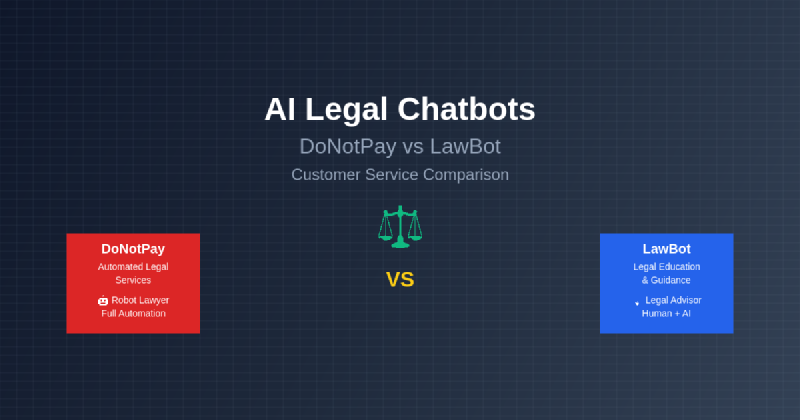The legal technology landscape has experienced a revolutionary transformation with the emergence of artificial intelligence-powered legal assistance platforms that democratize access to legal services and provide sophisticated customer support capabilities. Among the most prominent players in this rapidly evolving field are DoNotPay and LawBot, two innovative platforms that have redefined how individuals and businesses interact with legal processes through intelligent automation and comprehensive customer service systems.
Explore the latest developments in AI legal technology to understand how artificial intelligence is reshaping the legal industry and creating new opportunities for accessible legal assistance. The comparison between these two platforms reveals significant differences in approach, functionality, and customer service philosophy that impact user experience and overall effectiveness in addressing legal challenges.
Understanding AI Legal Chatbot Evolution
The development of AI-powered legal chatbots represents a fundamental shift in how legal services are delivered and accessed by the general public. Traditional legal consultation required expensive attorney fees, lengthy consultation processes, and complex procedural knowledge that often excluded individuals from seeking necessary legal assistance. The emergence of platforms like DoNotPay and LawBot has addressed these barriers by providing intelligent, automated legal guidance that operates around the clock and offers immediate responses to common legal questions and procedural requirements.
These platforms leverage sophisticated natural language processing capabilities, extensive legal databases, and machine learning algorithms to understand user queries, analyze legal contexts, and provide relevant guidance that would traditionally require professional legal consultation. The evolution of these systems reflects broader trends in artificial intelligence development, where complex professional services are being augmented and sometimes replaced by intelligent automation that delivers comparable results at significantly reduced costs and improved accessibility.
DoNotPay: The Robot Lawyer Revolution
DoNotPay, founded by Joshua Browder and often referred to as “the world’s first robot lawyer,” has established itself as a pioneering force in AI-powered legal assistance with a comprehensive approach to consumer protection and legal advocacy. The platform initially gained recognition for its ability to automatically contest parking tickets through intelligent analysis of citation details and automated generation of legally sound appeals that challenged improper or incorrectly issued violations.
The platform’s customer service philosophy centers around complete automation and user empowerment, providing subscribers with tools to handle various legal challenges independently without requiring traditional legal representation. DoNotPay’s interface is designed to guide users through complex legal processes step-by-step, offering personalized assistance that adapts to individual circumstances while maintaining consistency with established legal precedents and procedural requirements.
Experience advanced AI capabilities with Claude for comprehensive legal research and document analysis that complements traditional legal assistance platforms. The sophisticated reasoning capabilities of modern AI systems enable more nuanced understanding of complex legal scenarios and provide valuable support for legal professionals and consumers alike.
LawBot: Conversational Legal Intelligence
LawBot represents a different approach to AI-powered legal assistance, focusing primarily on conversational interactions and educational guidance rather than direct legal advocacy or document generation. The platform emphasizes providing users with comprehensive legal information, procedural guidance, and educational resources that enable informed decision-making about legal matters while maintaining clear distinctions between automated guidance and professional legal advice.
The customer service model employed by LawBot prioritizes transparency and user education, ensuring that individuals understand the limitations of automated legal assistance while maximizing the value of AI-powered guidance for common legal questions and procedural requirements. This approach reflects a more conservative philosophy regarding AI legal assistance, emphasizing support and education rather than direct legal representation or advocacy.
Comparative Analysis of Service Capabilities
The fundamental differences between DoNotPay and LawBot become apparent when examining their respective service capabilities and customer support methodologies. DoNotPay offers a comprehensive suite of automated legal services including parking ticket appeals, warranty claim assistance, subscription cancellation automation, small claims court document preparation, and various consumer protection services that directly interact with external organizations on behalf of users.
LawBot, in contrast, focuses primarily on providing legal information, answering procedural questions, and offering educational resources that help users understand legal processes without directly engaging in legal advocacy or representation. This distinction reflects different philosophical approaches to AI legal assistance, with DoNotPay embracing more aggressive automation and direct action while LawBot maintains a more cautious, educational stance that emphasizes user empowerment through knowledge rather than automated action.
Customer Service Infrastructure and Support
The customer service infrastructure of both platforms reveals significant differences in how they approach user support and problem resolution. DoNotPay operates primarily through automated systems with limited human intervention, relying on sophisticated AI algorithms to handle customer inquiries, technical issues, and service-related problems. This approach aligns with the platform’s overall philosophy of complete automation but can sometimes result in challenges when users encounter complex issues that require human judgment or personalized assistance.
LawBot maintains a more traditional customer service approach that combines AI-powered initial response systems with human support specialists who can address complex inquiries and provide personalized assistance when automated systems are insufficient. This hybrid approach offers greater flexibility in addressing user concerns while maintaining the efficiency benefits of AI-powered initial response systems.

The service delivery mechanisms employed by these platforms demonstrate how different approaches to AI legal assistance can serve distinct user needs and preferences, with DoNotPay appealing to users seeking comprehensive automation and LawBot attracting those who prefer educational guidance and human-supported assistance options.
User Experience and Interface Design
The user experience design of DoNotPay reflects its commitment to simplification and automation, featuring streamlined interfaces that guide users through complex legal processes with minimal input requirements and maximum automation. The platform’s design philosophy emphasizes reducing barriers to legal assistance by eliminating complex legal terminology and procedural knowledge requirements that traditionally prevented individuals from accessing legal services.
LawBot’s interface design prioritizes educational value and comprehensive information delivery, providing users with detailed explanations, relevant legal precedents, and contextual guidance that enables informed decision-making about legal matters. The platform’s approach recognizes that many users prefer understanding legal processes rather than simply automating them, appealing to individuals who value legal education alongside practical assistance.
Utilize Perplexity for comprehensive legal research to gather extensive information about legal precedents, case law, and regulatory requirements that inform decision-making in complex legal situations. The combination of multiple AI tools creates a comprehensive legal research environment that supports both automated assistance and traditional legal analysis.
Accuracy and Reliability Considerations
The accuracy and reliability of AI legal assistance platforms represent critical factors in their effectiveness and user satisfaction. DoNotPay’s aggressive automation approach has yielded impressive success rates in specific areas such as parking ticket appeals and subscription cancellations, where standardized procedures and predictable outcomes enable effective automated intervention. However, the platform’s broader legal assistance capabilities sometimes encounter limitations when dealing with complex or unusual legal situations that require nuanced judgment or specialized expertise.
LawBot’s more conservative approach to legal assistance generally results in higher accuracy for the information and guidance provided, as the platform focuses on well-established legal principles and procedures rather than attempting to automate complex legal advocacy. This approach reduces the risk of providing inappropriate guidance while potentially limiting the scope of assistance available to users with more complex legal needs.
Cost Structure and Value Proposition
The pricing models and value propositions of DoNotPay and LawBot reflect their different approaches to legal assistance and customer service. DoNotPay operates on a subscription-based model that provides unlimited access to its automated legal services, appealing to users who anticipate regular need for legal assistance or consumer protection services. The platform’s value proposition centers on the potential cost savings compared to traditional legal representation, particularly for routine legal matters that typically require expensive professional consultation.
LawBot’s pricing structure often incorporates both free educational resources and premium consultation services, reflecting its hybrid approach to legal assistance. The platform’s value proposition emphasizes the educational benefits of understanding legal processes while providing access to human expertise when automated guidance is insufficient for specific legal challenges.
Privacy and Security Implementations
Privacy and security considerations are paramount in legal assistance platforms, as users frequently share sensitive personal information and confidential legal details that require robust protection measures. DoNotPay implements comprehensive encryption protocols and data protection measures designed to safeguard user information while enabling the automated processing necessary for its legal assistance services. The platform’s privacy policies address the unique challenges of automated legal assistance, including data retention requirements and information sharing protocols with external organizations.
LawBot’s privacy and security framework emphasizes user control over personal information sharing and provides transparency regarding data usage and retention policies. The platform’s approach to privacy reflects its educational focus, ensuring that users understand how their information is used while maintaining strict confidentiality standards for all legal consultations and guidance sessions.

The implementation of robust privacy and security measures by both platforms demonstrates the critical importance of protecting sensitive legal information while enabling effective AI-powered assistance that meets user needs and regulatory requirements.
Integration with Traditional Legal Services
The relationship between AI legal assistance platforms and traditional legal services represents an evolving aspect of the legal technology landscape. DoNotPay’s approach often positions its services as alternatives to traditional legal representation for routine matters, emphasizing cost savings and accessibility advantages over conventional legal consultation. However, the platform also recognizes limitations and provides guidance about when traditional legal representation may be necessary for complex legal challenges.
LawBot’s integration philosophy emphasizes complementing traditional legal services rather than replacing them, positioning the platform as an educational resource and initial consultation tool that can help users make informed decisions about when to seek professional legal representation. This approach appeals to legal professionals who view AI assistance as a valuable supplement to traditional legal services rather than a competitive threat.
Regulatory Compliance and Legal Limitations
Both platforms operate within complex regulatory environments that govern the provision of legal services and establish clear boundaries between automated legal assistance and professional legal representation. DoNotPay navigates these regulatory requirements by carefully defining its services as document preparation and procedural assistance rather than legal advice or representation, ensuring compliance with professional licensing requirements while maximizing the scope of automated assistance available to users.
LawBot’s regulatory compliance strategy emphasizes transparency and user education about the limitations of automated legal assistance, ensuring that users understand when professional legal representation is required and helping them make informed decisions about appropriate legal resources for their specific situations. This approach reduces regulatory risk while maintaining the educational value and practical utility of the platform’s services.
Future Development and Innovation Trends
The continued evolution of AI legal assistance platforms reflects broader trends in artificial intelligence development and legal technology innovation. DoNotPay’s roadmap includes expansion into additional legal areas, enhanced automation capabilities, and improved integration with external legal systems that could further streamline legal processes for consumers. The platform’s innovation focus emphasizes increasing the scope and effectiveness of automated legal assistance while maintaining user-friendly interfaces and comprehensive customer support.
LawBot’s development priorities include enhanced educational resources, improved conversational AI capabilities, and expanded integration with traditional legal service providers that could create seamless transitions between automated assistance and professional legal representation. The platform’s innovation approach reflects its commitment to supporting informed legal decision-making through improved access to legal education and expert guidance.
Performance Metrics and User Satisfaction
Comparative analysis of performance metrics and user satisfaction reveals important differences between the two platforms’ effectiveness in serving their respective user bases. DoNotPay’s success metrics often focus on tangible outcomes such as successful parking ticket appeals, completed warranty claims, and subscription cancellations, providing measurable value that users can easily quantify and appreciate.
LawBot’s performance metrics emphasize user education effectiveness, consultation satisfaction, and successful transitions to appropriate legal representation when necessary. These metrics reflect the platform’s educational focus and highlight its effectiveness in helping users understand legal processes and make informed decisions about legal assistance needs.
The measurement of customer satisfaction across both platforms reveals that user preferences often align with platform philosophies, with automation-focused users gravitating toward DoNotPay’s comprehensive automated services while education-focused users prefer LawBot’s detailed guidance and human-supported assistance options.
Industry Impact and Market Positioning
The impact of DoNotPay and LawBot on the broader legal technology market demonstrates how different approaches to AI legal assistance can coexist and serve distinct market segments. DoNotPay’s aggressive automation strategy has influenced the development of numerous competing platforms that seek to replicate its success in specific legal areas, while also prompting traditional legal service providers to explore AI integration opportunities.
LawBot’s educational approach has contributed to increased acceptance of AI legal assistance among legal professionals and regulatory bodies by demonstrating how artificial intelligence can complement rather than replace traditional legal services. This positioning has facilitated broader adoption of legal technology solutions across the industry while maintaining important distinctions between automated assistance and professional legal representation.
The continued growth and evolution of both platforms reflect the expanding market for accessible legal assistance and the increasing sophistication of AI technologies that enable more effective automation and educational support for legal processes. Their success has validated the potential for AI-powered legal assistance while highlighting the importance of appropriate positioning and regulatory compliance in this rapidly evolving field.
Disclaimer
This article is for informational purposes only and does not constitute legal advice or professional recommendations. The comparison of AI legal assistance platforms is based on publicly available information and general observations about their services and capabilities. Users should conduct their own research and consider their specific legal needs when selecting appropriate legal assistance resources. The effectiveness of automated legal assistance may vary depending on individual circumstances, jurisdictional requirements, and the complexity of specific legal matters. Always consult with qualified legal professionals for complex legal issues or when professional representation is required.
